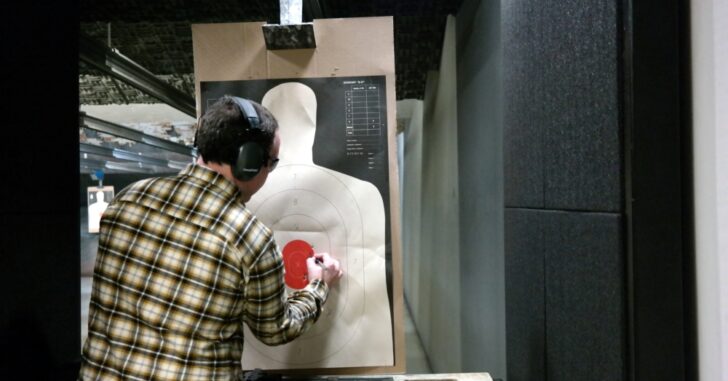Every person who owns a gun should practice with it with live ammunition. There is no “perfect amount” of practice. The gun you have right now in your possession will save your life if you use it properly.
So, how often do you go to the range and practice?
It’s a question that’s bound to draw a variety of responses. There’s plenty of people who will say, “oh, once or twice a month.”
There’s others that make it a weekly event.
And there’s still an even smaller pool of people who join organizations like the International Practice Shooting Confederation (IPSC) and practice for competitive events.
Our best suggestion? Find an activity that makes practice fun.
How To Make Shooting Practice Fun
Join a shooting organization or group. Schedule regular meetups and even make it competitive using shot scoring and timers. If competitive isn’t your thing, focus instead of making the course interesting for you.
Our suggestion? Google shooting organizations in your area.
If you have a Rod & Gun club or similar gun range, you can go in and ask what they have available.
Almost every gun range will feature some NRA certified pistol courses.
This will improve both your understanding and readiness with your concealed carry pistol.
Range Time Is Train Time
Any time you’re at the range, it’s an opportunity to build upon what you practiced last time and experiment with new techniques that you will need.
Our common motto here at Concealed Nation: “train how you intend to fight.”
If you don’t like working with others or prefer to just work on your own time, challenge yourself with keeping track of your progress. It’s a simple thing. Throw up a target for your first volley and record your first shot group. Keep that target. The next time you go to shoot, do it again. Date and sign the target so you can track your progress. If you don’t like the level of improvement, the best thing you can do is either take a class to correct behavior or practice more regularly.
For beginners, especially, we recommend taking a class because it’s sometimes beneficial to have a second set of eyes look at your stance and posture. A trained instructor can often give you tips and suggestions to improve your handling of a handgun.
Even experienced handgunners sometimes get caught into traps of bad basic behavior that can lead to inconsistent results.
The best thing a concealed carrier can do for his range performance is seek help. All it takes is once and almost anyone with any amount of experience will be glad to improve the aim of someone who may either come to their defense or the defense of another.
After all — we’re on the same team.
The advantages of regular practice will become apparent through steady progress.
Advantages of Regular Firearms Practice
The advantages of regular firearms practice include (but are not limited to):
- Improved confidence in yourself and your handling of firearms
- More reliable and consistent shot groupings
- Better target identification
- Reinforcing gun safety and marksmanship
- It’s fun
Firing a gun at a range is fun. It’s exhilarating. So long as you’re using proper gun safety and eyes & ear protection, it’s absolutely safe. And for the cost of a hundred or so rounds of ammunition, you can have a good time and improve on skills you will use to save your life in a defensive gun use scenario.

